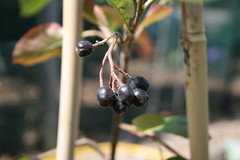 Image via WikipediaGuest Post by Steve Andrews
Image via WikipediaGuest Post by Steve Andrews Robert L. Hirsch, Roger Bezdek and Robert Wendling have coauthored a new publication, this time a book called “The Impending World Energy Mess: What It Is and What It Means to You,” a book to be released by publisher Apogee Prime late this month.
Andrews: In your earlier work dating back at least five years, you resisted forecasting a time frame for peak oil. There seems to be a bit of a change on that front in your book. Care to comment on that?
Bob Hirsch: In years past, there was considerable uncertainty in my mind about when the decline of world oil production might begin. Recently it became clear to me that it’s going to be sooner rather than later. I believe that the onset of the decline of world oil production is likely in the next two to five years. And when I say “oil,” I mean all liquid fuels.
Andrews: You say that once declining oil supplies hits, we’re likely to experience deepening worldwide economic damage. How is that likely to unfold? What is your most likely scenario?
Hirsch: Our thinking is that what happened in the two sudden oil shocks of 1973 and 1979 is very likely to be repeated when oil decline sets in. Those were two real world examples of oil shocks surprising people and causing panic. We believe that the same kind of thing is going to happen again, except that the problem is going to last much, much longer because, unlike before, there will be no unused oil supply valves to turn on this time.
While economies have changed since the 1970s, the dependence on and importance of liquid fuels has not. And human nature hasn’t changed. People panic when they get suddenly frightened. Even though -peak oil‖ is recognized by a number of people, it is yet to be realized on a wide scale.
In the book we avoided consideration of such things as anarchy, wars, and other catastrophes that are conceivable. We see very little chance that things will be any better than what we describe, but things could easily be worse.
By the same token, we have faith that humankind is not going to collapse because of the oil decline problem. The world is in for considerable pain for a long time. Nevertheless, we have great faith in human resilience. People will come around, get very pragmatic, dig in and do what’s necessary to meet the challenges. As a result, when we get through all of this-which is going to take longer than a decade-the societies that emerge are going to be much stronger and much more pragmatic than they are today.
Andrews: You note that there will be no quick fixes. What mix of crash programs are you currently recommending as the focus of any accelerated policy efforts today?
Hirsch: We sketch practical, physical mitigation options for the world. They are the ones we described in 2005, plus or minus a few changes due to our being a little smarter now in some areas. In the book, we added what we call “administrative mitigation,” such as forced carpooling, forced telecommuting, and rationing. There is benefit to be gained from those options, but their implementation will not be simple.
For instance, rationing seems like a relatively simple concept but after one considers the details, it is incredibly complicated due to decisions that have to be made, the bureaucracies that have to be built, and the enforcement that has to be implemented. Understanding the complexities is necessary for practical decision-making. . . .
Robert L. Hirsch, Roger Bezdek and Robert Wendling have coauthored a new publication, this time a book called “The Impending World Energy Mess: What It Is and What It Means to You,” a book to be released by publisher Apogee Prime late this month. Hirsch will present material from his upcoming book at the October 7-9 ASPO-USA conference. Please see the full agenda for details at aspousa.org. He has spent his entire career working in the energy realm, from the oil sector to numerous forms of electric power generation. In 2005, this team published “The Peaking of World Oil Production: Impacts, Mitigation & Risk Management.” Steve Andrews caught up with Bob Hirsch last week for Steve’s last interview and final work with the Peak Oil Review. (Steve co-established the Peak Oil Review the Tom Whipple some 243 issues ago in January 2006 and has both enjoyed and enormously appreciated a very close collaboration with Tom for nearly five years; Steve is now moving on to other endeavors.)







